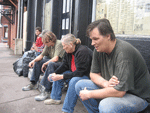Canada: One in five New Brunswickers below the low-income threshold
Published on Thu, 2011-09-29 12:57
Poverty costs tax-payers of the eastern province of New Brunswick more than $2 billion (some U$S 1,9 billion) a year, according to a report released Tuesday by the Common Front for Social Justice and the Canadian Centre for Policy Alternatives, one of the focal points of Social Watch in the North American country. The study found poverty has many direct costs to government and hidden costs to society. In a call for government action, the authors said a plan to lower poverty levels could cost as little as half as much as the annual costs of poverty, wrote John Chilibeck, a journalist at The Daily Gleaner, a New Brunswick newspaper. "We are rich enough to alleviate poverty, but governments haven't been convinced of the moral imperative," said Christine Saulnier, the report's co-author and director of the Canadian Centre for Policy Alternatives in the neighbouring province of Nova Scotia. "That's why these numbers are so important. It's not acceptable to say we can't afford to do this because once we show the numbers, it's clear we can't afford not to do it." Using data from the Canadian Institute for Health Information, the authors said poverty costs the health care system almost $200 million a year. Poor people tend to suffer more ailments and use health care services more frequently, so by comparing the number of people in poverty in New Brunswick to people in the next income level and their health care costs, the authors found a difference of $196 million. Poverty leads to more crime, and the report said the cost to New Brunswick is $88 million a year, based on a federal Justice Department report suggesting poverty accounted for four per cent of crime costs. Tack on lost income tax and other productivity lags, and the final bill comes to just more than $2 billion. The findings were based on data showing that about 146,000 people in New Brunswick are below the low-income threshold -- the income level at which members of a family may be in tough circumstances because it has to spend a greater portion of its income on the basics, such as food, clothing and shelter, than does the average family of similar size. Roughly one in five people in the province are in this category. "Since the 2008 economic crisis, many workers have lost their jobs, while many others are struggling to get by on low-pay, part-time work," said Jean-Claude Basque, the provincial coordinator for Common Front, in a news release. "At the same time, food, gasoline, heating oil and housing prices have climbed. Now more than ever, people in poverty need a strong social safety net. Keeping thousands of citizens and their families in poverty is costly, and also immoral." The Department of Social Development has a budget of $1 billion, so tacking on another $1 billion would double its annual spending. George Piers has worked with poor people for more than 30 years. The administrator for the Fredericton Community Kitchen, where three hot meals are served a day to the needy, hadn't seen the report but he offered some of his own opinions on how to alleviate poverty. "You have to ask what programs work and don't work. Subsidized housing would be my suggestion. If you're paying 90 per cent of your income on housing and then suddenly it's only 30 per cent, that makes quite a difference," he said. Piers said he has seen the impact on people who have benefited from new subsidized housing over the last year. The extra money helps these people get their lives on track, he said. He also argued that more money had to be spent on addiction and mental-health services, issues that plague many of the poor. In 1982, the soup kitchen served about 30 people a day. It's up to 350 people a day, a growth rate much higher than Fredericton's population. Source » |
SUSCRIBE TO OUR NEWSLETTER



